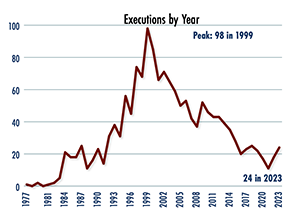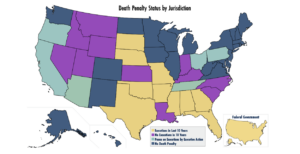Texas was one of only five states that carried out executions this year and one of only seven that imposed new death sentences, the Death Penalty Information Center reported.
Florida, Alabama, Missouri and Oklahoma joined Texas as the only states conducting executions this year, the center reported. The eight executions carried out in Texas and the six in Florida accounted for more than half of the 24 conducted in the United States in 2023. Nine of the inmates executed this year were people of color, “The Death Penalty in 2023: Year End Report” revealed.
Arizona, California, Louisiana and North Carolina joined Texas, Florida and Alabama as the only states this year that sentenced convicted individuals to death.
Mentally ill inmates executed
The center reported 79 percent of the inmates executed in 2023 had serious mental illness, brain injury, developmental brain damage, intellectual disability or had experienced chronic serious childhood trauma, neglect or abuse.
Texas executed three inmates in 2023—Jedidiah Murphy, Arthur Brown and Gary Green—who presented evidence of mental illness or intellectual disability.
Another Texas inmate—Scott Panetti—was slated for execution in spite of a diagnosis of schizophrenia and history of mental illness. However, the U.S. District Court of the Western District of Texas ruled Sept. 28 the state could not execute him.
William Keith Speers, inmate coordinator of the faith-based program on Texas Death Row, was scheduled for execution Oct. 26, but the Texas Court of Appeals granted a last-minute stay of execution. In his application to the appeals court, Speers asserted his previous legal counsel failed to present to the jury evidence of his long history of trauma due to childhood abuse and neglect.

John Litzler, public policy director for Texas Baptists’ Christian Life Commission, said the execution of prisoners with mental illness or serious impairment conflicts with the CLC’s commitment to a “culture of life.”
“We are grieved by the statistics in the Death Penalty Information Center’s annual report and, in particular, the data about high rate of execution for individuals with an intellectual disability or suffering from mental illness,” he said.
Sign up for our weekly edition and get all our headlines in your inbox on Thursdays
“While we support victims of heinous crimes and their right to justice, those with certain intellectual disabilities and mental illnesses often lack the mental ability to understand the consequences or sometimes even the wrongness of their actions. In those instances, a true commitment to both justice and a culture of life dictates more appropriately measured consequences.
“During the legislative session the Christian Life Commission supported two separate bills aimed at prohibiting capital punishment for those with intellectual disability and those suffering from schizophrenia or schizoaffective disorder. Each bill passed the House of Representatives, but failed to pass in the Senate. The annual report motivates the CLC to continue its efforts to promote a culture of life in the State of Texas.”
Lawmakers in Arizona and Arkansas also considered legislation to exempt inmates with severe mental illness from the death penalty, but the bills failed.
Texas has the third-largest Death Row population in the country with 192 inmates, behind California at 665 and Florida at 313, the center’s end-of-year report noted.
Texas an ‘outlier’ in terms of executions
Stephen Reeves, executive director of Fellowship Southwest, voiced strong concern about what the end-of-year report revealed.

“Texas continues to be a sad outlier in the business of killing prisoners. The latest report shows once again that we reserve capital punishment almost exclusively for the poor, the mentally ill, the abused and the unlucky,” Reeves said.
“It is well past time that Texans of good conscience, and especially Christians, demand an end to this unjust and barbaric practice.”
The Death Penalty Information Center’s year-end report supported Reeves’ characterization of Texas as an “outlier” in terms of capital punishment.

The report noted 2023 was the ninth consecutive year when fewer than 30 inmates in the United States were executed and fewer than 50 received a death sentence, as of Dec. 1. Nationally, the number of executions peaked in 1999 when 98 inmates were put to death.
This year marked the first time more Americans (50 percent) told Gallup pollsters they believe the death penalty is administered unfairly than say it is conducted fairly (47 percent).
 Three new exonerations of Death Row inmates—John Huffington in Maryland, Jesse Johnson in Oregon and Glynn Simmons in Oklahoma—occurred in 2023. Together, the three men served more than 140 years in prison before their convictions were overturned.
Three new exonerations of Death Row inmates—John Huffington in Maryland, Jesse Johnson in Oregon and Glynn Simmons in Oklahoma—occurred in 2023. Together, the three men served more than 140 years in prison before their convictions were overturned.
Inmates executed in 2023 spent an average of 23 years in prison—the longest average time since the death penalty was reinstated in 1976, the center reported. Their average age at the time of execution was 54.
“The data show that most Americans no longer believe the death penalty can be imposed fairly,” said Robin M. Maher, executive director of the Death Penalty Information Center.
“That important change can also be seen in the unprecedented show of support for death-sentenced prisoners from conservative lawmakers and elected officials this year, some of whom now oppose use of the death penalty in their state.”

Twenty-nine states either have abolished the death penalty or have paused executions by executive action. Arizona and Pennsylvania both paused executions through executive actions in 2023.
















We seek to connect God’s story and God’s people around the world. To learn more about God’s story, click here.
Send comments and feedback to Eric Black, our editor. For comments to be published, please specify “letter to the editor.” Maximum length for publication is 300 words.